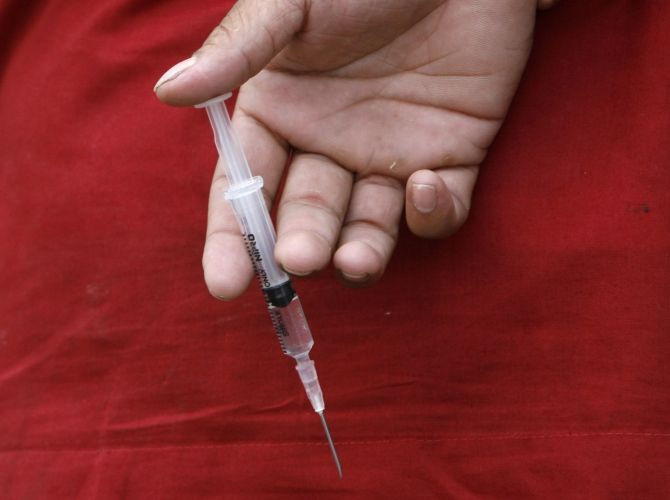No Needles, No Pain: Get Ready For Ultrasound Vaccinations

New research promises to take the pain and fear out of injections by developing a way to enhance the skin's permeability to drugs. Researchers say that this research could pave the way for injection-free vaccinations.
The technique could be used to deliver any drug that is now delivered via capsules. Skin patches can be made more effective and skin conditions like acne and rashes can be treated easily as the drugs go directly into the skin.
"This could be used for topical drugs such as steroids-cortisol, for example-systemic drugs and proteins such as insulin, as well as antigens for vaccination, among many other things," said Carl Schoellhammer, an MIT graduate student in chemical engineering and one of the lead authors of the study paper.
The new technique increases permeability by using ultrasound waves. These waves remove a thin top layer of the skin making it easier for drugs to penetrate. The researchers have known for some time that drugs can be delivered through the skin with the help of ultrasound waves.
The new research from MIT takes it a step further by using two ultrasound beams, instead of one, that increases skin's ability to absorb drugs. They used one low frequency ultrasound wave and one of high frequency ultrasound wave.
The researchers explain that when ultrasound waves travel through a fluid, or drug, they create tiny bubbles that move around randomly. At one stage these bubbles explode and are replaced by fluid bubbles that enter the empty spaces. This process creates "microjets" that are capable of causing microscopic peeling of the skin.
They found that high frequency ultrasound waves created more bubbles and the low frequency ones popped them, making the entire system faster and more effective.
The drug delivery system was tested on the skin of a pig. The researchers applied glucose and inulin (a carbohydrate) to the skin that was treated with ultrasound waves. They found that glucose absorption was 10 times better while inulin absorption was four times better compared to older techniques of drug delivery through skin.
"It's a very innovative way to improve the technology, increasing the amount of drug that can be delivered through the skin and expanding the types of drugs that could be delivered this way," said Samir Mitragotri, a professor of chemical engineering at the University of California at Santa Barbara. Mitragotri was not part of the research team.
The researchers say that the skin remains permeable for up to 24 hours after being treated with ultrasound waves. They say that the technique can help diabetic patients manage their glucose levels through improved delivery of insulin.
The study was published in the Journal of Controlled Release.



























